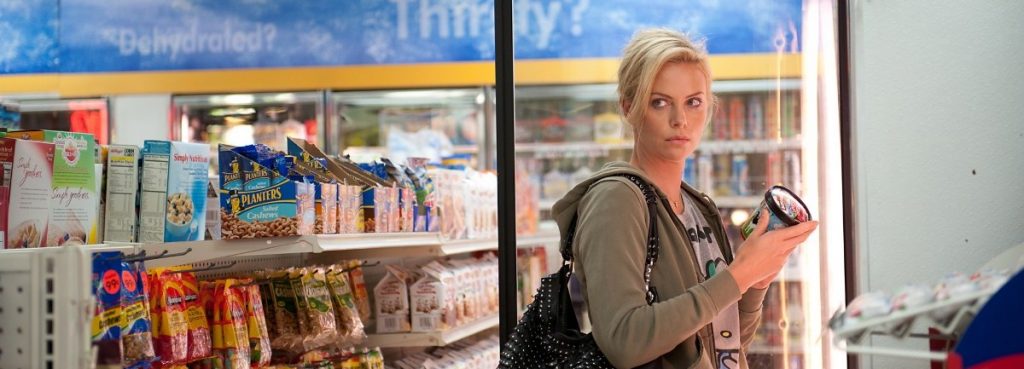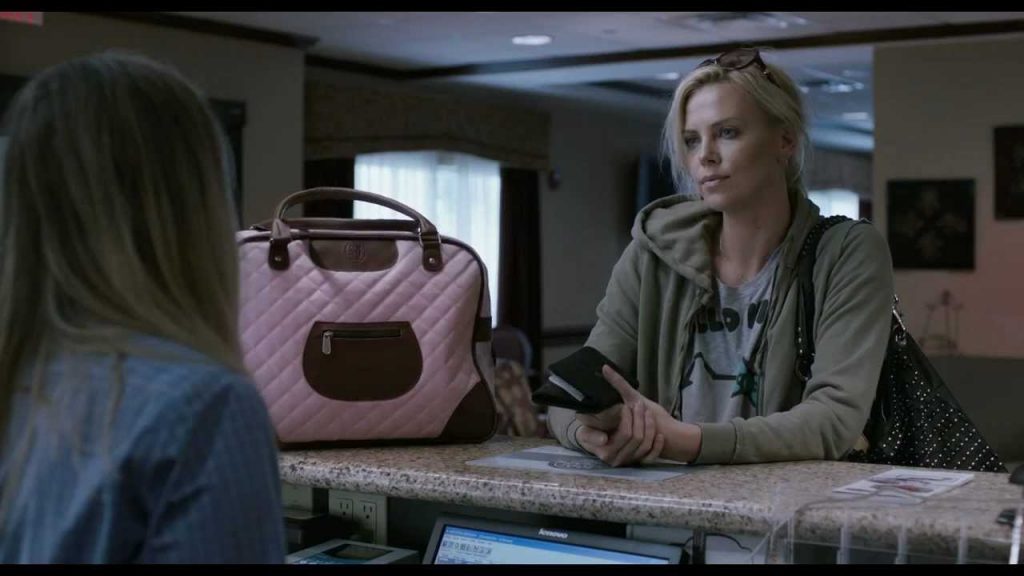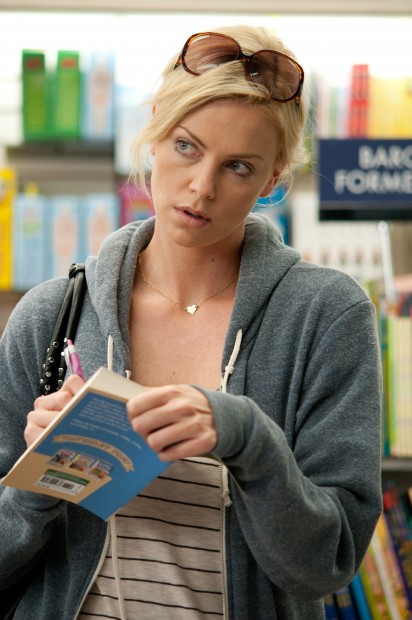Alex writes about the 2011 film Young Adult.
Look, this isn’t my best work. I have stared at the page for hours and watched the movie repeatedly with a notebook by my side, and yet I still cannot say I am happy with what you are about to read. For a film that is so fresh and creative, I have written something dull and predictable, compounding the latter by now falling into the doubly predictable crutch of self-reflexive self-commentary as a way of salvaging the essay before it even begins in proper.
This is an essay about an opinion in flux, and a movie about a character in flux. There are no simple answers here, only hopes that things can be better than they are. But when that can’t be the case, vague cover-ups of incomplete thoughts will have to do. At some point, you have to let it go.
The image is a funny one. She is hung over and still in her clothes from the night before, rolling out of bed, past a television playing the Kardashians, and struggling her way over to the fridge. She finds a 2L bottle of Diet Coke, and tips it upward, filling herself with cold aspartame in the hopes that it will make her body and brain stop hurting. This is clearly not the first time it has happened, and it certainly will not be the last.
Since you have gotten here by clicking on a link next to an image of Charlize Theron, by now you have deciphered I am talking about the film Young Adult. My intentions were to make it read as though this wasn’t, in fact, Mavis Gary, but a teenager. Due to the visual nature of the medium and my own limitations as a writer, this was impossible; I’m sure writer Diablo Cody and director Jason Reitman had the same issue with the former (but, of course, not the latter).
The main appeals of Young Adult are obvious to any and all who have seen it: the film is incredibly funny, Charlize Theron’s performance is magnificent, and the script is uniquely dark and intriguing. Mavis is a Minneapolis-based young adult ghostwriter who is writing the final installment of the Waverly Prep series, which is what she is working on when she finds out her high school boyfriend just had his first child in their old hometown. Mavis becomes bound for Mercury, Minnesota, to see the man who once loved her and whom she still believes she is meant to be with. From the very beginning, delusion is integral to Young Adult, and it only gets darker from there.
One of the consistent joys of watching Young Adult is how Cody twists teen movie conventions to feature people in their late thirties, pointing out how you can never go back without appearing delusional. After a seemingly frustrating meatloaf dinner with her parents, Mavis does what any good teenager would do: runs to a friend’s house to get drunk. At a show, Mavis bumps into somebody who she clearly does not like, and their banter is cuttingly mean, although the banter now includes jabs about being a single mom. Finally, there’s a house party scene complete with a romantic confrontation, overconsumption, and an emotional breakdown on the front lawn as all attendees watch. But at this point in life, this all happens at a baby naming ceremony at 1pm on a Saturday afternoon. It would be hilarious if it weren’t so hard to watch.
Mavis’ foil in the movie is Matt Freehauf, somebody she ignored entirely in high school but who is now seemingly the only person in Mercury willing to go drinking every night. It is in these scenes where Mavis’ delusions become the most obvious, when she starts talking like somebody in high school, somebody whom Mavis would create to tell her own version of somebody else’s story.
“Matt, don’t you get it? Love conquers all. Have you not seen The Graduate? Or, like, I don’t know, anything?”
Theron’s performance in a handful of scenes like this is integral to the film, partially because she’s funny, but mostly because it shows the depths of Mavis’ delusion in a way words never can. When Mavis sets a date to meet with Buddy at Champion O’Malley’s, her reaction is similar to a high school character being asked out by her crush. When she hugs Buddy later in the film, Mavis grabs him like it’s the only hug she’s ever going to get, the way you hug somebody you care about when you’re sixteen. Finally, in the big party confrontation scene, Mavis talks to Buddy in a way no adult ever would, like a teenager who is saying things that are borderline insane for somebody in their thirties to be saying.
“Buddy, these last few days have been some of the best of my life,” she says to an obviously confused Buddy. Then Mavis doubles down on her YA speak and whispers, “Buddy… My moon, my stars, you’re my whole galaxy.”
Mavis attempts to kiss Buddy, who pushes her face away and asks her to leave, because this is no teen movie. The popular kids don’t end up together simply because they’re both popular and attractive, and Save Ferris doesn’t play on the roof of the house to celebrate this union.
Needless to say, Mavis immediately starts drinking heavily.
When Young Adult was released in late 2011, I enjoyed it thoroughly, very excitedly demanding that James and I do a podcast about a film I felt was soon to be forgotten by culture. It was obvious at the time of its release that Young Adult wasn’t going to make a dent, but it was equally obvious that the film was going to stick with me over time.
In our eventual podcast, recorded in April 2012, I believe I focused more on the external aspects of the world helping Mavis to continue her own delusions than the internal aspects of her character. I talked a lot about the Kardashians and reality television, because reality television is the first sound we hear in this movie, and it’s a motif used repeatedly in relation to Mavis. (She watches reality TV four times: a clip of a show called Kendra opens the movie, there are two clips of Kourtney and Khloe in Miami or whatever later on, and there is a brief look at some singing competition.)
The movie’s lynchpin scene is one with Matt’s sister Sandra, the morning after Mavis’ breakdown at Buddy and Beth’s party. Mavis has finally accepted that she might be the problem – “I need to change, Sandra” – before Sandra explains to her that she’s the only cool person from Mercury. Everybody here, Sandra says, is fat and dumb. Mavis is the cool one who got out, the only one who is living a dream existence.
In her moment of need, Mavis found what could keep her how she is: external confirmation of what she hoped was true, that she was the beautiful and unique snowflake, a distinction that makes you unlikeable in high school but is never going to be assumed to destroy your life (assuming the teenager grows out of said thoughts about themselves). Mavis was in the wind, waiting to be directed in a positive direction before being guided backwards by the first voice that confirmed her unhealthy desires.
I have not listened to this podcast since we recorded it – listening to an hour of my own voice would be a very Mavis thing to do – but having recorded it in Spring 2012, I’m certain that was my take. Mavis is a villain, and Sandra is her cheerleader, there to remind Mavis that it is indeed okay to live like this. The Kardashian family was reaching a sort of nadir in my world at the time – Kanye West, somebody I’m mildly obsessed with, began publicly dating Kim Kardashian right around the time of this podcast – and therefore that is the aspect of the film I chose to examine. Plus, I was six years younger, six years more willing to ignore the internal in favour of external. It makes sense that this is where my head was at during that period: of course it was the fault of others, because it’s never your fault.
Today, I find myself focusing more on the internal journey Mavis goes through over the course of the movie, and all the various facial cues the movie relies upon Theron to convey to the audience. Until that climactic breakfast conversation, there are no monologue-length confessions from Mavis about how she feels the need to change (merely a brief admission to her parents that she is an alcoholic, an admission that promptly gets laughed off). The most prominent Theron face journey happens when Beth’s band Nipple Confusion starts performing Mavis’ favourite Teenage Fanclub song, leading Mavis to have her own silent calamitous moment before downing her drink and saying some super weird shit to Buddy. These are Mavis’ brief moments of humanity, moments she shuts out by chugging alcohol. And when the alcohol is swapped for coffee, the extinguishing is left to those around her.
The final morning of the movie is meant to mirror elements of Mavis’ life in the Minny Apple: she wakes up with a man’s arm draped across her body, and gets out of bed to go sit across the table from and have coffee with another woman. In the Mercury morning, Mavis briefly offers Sandra coffee before essentially being told that she is not the type of person who should be getting somebody else coffee. In Minneapolis, her French fry feasting friend sarcastically ribs Mavis’ words without her realizing, while in Mercury, Mavis is actively told her concerns about her failures are unwarranted. Mavis heads to her hotel to pick up her stuff and have a donut-related confrontation, before shipping out to a diner to finish her book.
Throughout the movie, we see Mavis putting herself above everybody around her, existing in a rarefied air alone, with only Buddy invited to join her in the cloud paradise. When Buddy tells Mavis that Beth is the drummer in Nipple Confusion, Mavis responds by saying that’s embarrassing, because there is nothing Mavis would want less than to be at the back of the stage. Of course, nobody is truly successful alone; every band needs somebody to keep time, to help them keep track of where they are. The extreme close ups of the cassette in the deck of Mavis’ Mini Cooper serve a similar purpose: this cassette isn’t a singular superstar making her favourite song come through the speakers, it’s a bunch of cogs coming together. There is no individual here, instead a collection of spools and magnetic tape.
A key distinction pervades throughout the movie, one that Mavis seems unwilling or unable to make about her own life, even in her own head: she is a ghostwriter. She is a successful writer, sure, but only because of the road Jane McMurray set out for her. Mavis gets to write her stories, but only if they fall in line with the large Waverly Prep series bible on the shelf above her desk. Mavis’ name is not the biggest type on the cover; it’s not even bolded. (At one point in the movie, Mavis casually mentions to Beth that she is only a ghostwriter, but even that reeks of a politeness power move over Beth more than actual humility.) Mavis is a drummer in her own professional existence, keeping time for the person on the front cover, no matter how embarrassing she might think that is.
One of the more enjoyable – and admittedly obvious – gadgets of Young Adult’s screenplay involves the moments in the film where Mavis is writing her final Waverly Prep book. The main character, Kendal Strickland, is an obvious stand-in for Mavis’ feelings on herself: somebody who could get voted prom queen even though somebody from the school had recently died. These narration scenes are mostly played to comedic effect, to show an inner monologue without actually using an inner monologue, or for showing how Mavis comes up with the great term ‘textual chemistry.’ The end of the film though – and therefore the end of the book – sees Mavis saying goodbye to Buddy Slade (hopefully) once and for all. The book version of Buddy and his girlfriend go out to sea – “Who could have imagined when Ryan and his girlfriend set sail that day, it would be the last time anyone ever saw them?” – never to be seen again. And then Mavis goes out to look at her fractured Mini, to decide where she goes next.
Enough time has passed that something I once viewed as primarily a comedy about what the world turns us into can now be seen as a tragedy about what we turn ourselves into. Nobody is going to help you, the movie says: the only person who will talk to you wants to have sex with you, and that same person’s sister wants to be you. The end of Young Adult isn’t necessarily decisive, but judging by a brief but all-important Theron face journey, I can’t imagine many viewing it as a positive ending, an exception being (possibly) Mavis. She has finally gotten to a point where she is able to accept things might be her fault – admitting her alcoholism, confessing to the insanity of her plan to get Buddy back – but in each instance the person she talks to laughs her off. Mavis finishes the book with a paragraph about how Kendal is graduating from Waverly Prep, steps out of the diner, stares at her broken car (a battered transportation device, no less), and gets in it as the film cuts to black. We don’t see if she listens to Teenage Fanclub as she drives away, or if her best days really are ahead of her. She finally has her own voice to listen to, and we’ll never see where that drives her. One can make their assumptions though.
Every time I watch this film, I wonder if Diablo Cody feels this ending is a hopeful one. I won’t project for her, for all the obvious reasons, but my guess would be that she does see it as hopeful. The process of writing tends to be inspired by wanting to analyze something that has been bothering you in the hopes of being able to move on from it. Mere consumption and the pessimistic conclusions that can come with it are typically left to the viewer (or maybe Charlie Kaufman). Writing is for stewing in something before moving past it, while the static process of consuming merely encourages the stew portion of things. Frequently writers will describe a seemingly pessimistic ending as one that is hopeful in their eyes, because they want to believe the person or concept they have spent so much time thinking about will work out okay. It might, but it also might not.
One of Jason Reitman’s most subtly intriguing directorial choices in Young Adult is found within the use of its score. In the opening seven-and-a-half minutes of watching Mavis at home in the Minny Apple, none of Rolfe Kent’s score is employed, and we are left to watch Mavis with only diegetic sound to accompany us. The second Mavis decides to head to Mercury, however, the score begins and she packs her bag to begin the well-trodden coming home narrative. We lose the sound of reality and enter the world of the cinematic construction, because that’s where Mavis is driving us.
When Mavis is standing in front of her car in the final scene of the movie, having just completed her novel, the score fades away, leaving Mavis once again alone in the stark silence of reality. Will the music start again, or will she hear what is around her? No answer is given, because there is never an answer given.






